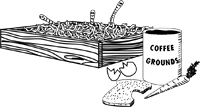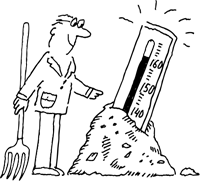 Composting is the decomposition of organic material such as leaves, twigs, grass clippings, and food scraps. Composting helps to keep organic material out of our landfills and turns that material into a useful product.
Composting is the decomposition of organic material such as leaves, twigs, grass clippings, and food scraps. Composting helps to keep organic material out of our landfills and turns that material into a useful product.
Compost is the soil product that results from composting. It is great for gardens and landscaping and can save you money by not having to buy soil conditioners and fertilizer.
 Composting Can Be Easy!
Composting Can Be Easy!
Composting can be practiced in most backyards in a homemade or manufactured composting bin. Instructions for making your own backyard composting bin and vermicomposting (worm!) bin are available by attending a FREE workshop at the Escondido Community Garden located at Centre City Parkway and Decatur Way.
The City of Escondido offers a basic bin for sale at cost. Call 760-839-4342 for information and pricing.
Temperature & Time
Compost piles with the right blend of greens and browns that are kept moist will heat up to a temperature of 120°F–160°F. This high temperature will kill most weed seeds and produce compost in two months. Compost piles that aren't maintained as well will also create useable compost, but it will take much longer.
 When Is It Done?
When Is It Done?
Your compost is finished when the original material has been transformed into a uniform, dark brown, and crumbly product with an earthy aroma.
Give It A Try!
Attend a FREE workshop.